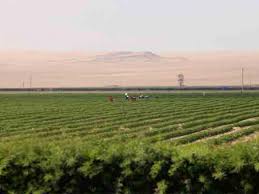
Imagine this: You are a farmer in the Middle East, where the sun burns like a relentless forge. Every day you hope for rain, but all that comes is dust and more heat. Welcome to agriculture and water scarcity in the Middle East, an everyday reality faced by millions.
This is not just about farmers sweating under a scorching sun or barren fields stretching as far as eyes can see. It is also about cities thirsting for clean water, nations grappling with dwindling supplies and economies straining under escalating demands of growing populations.
The stakes are high – it’s not only crops on the line here; livelihoods hang in the balance too! The lack of sufficient water affects food production drastically impacting regional security and economic development.
Together, we will explore the heartlands grappling with droughts brought on by climate change. We will traverse fields that rely on costly desalination for irrigation. It is a journey of understanding and witnessing firsthand the effects of our changing environment.
Understanding Water Scarcity in the MENA Region
The Middle East and North Africa, often referred to as the MENA region, is no stranger to water scarcity. As one of the most arid regions globally, it’s a pressing issue that affects everything from food security to economic development.
Water sources are limited with climate change making matters worse by increasing evaporation rates and decreasing precipitation levels. The MENA region like some other regions across the world face a tough challenge in terms of water scarcity, with countries such as Saudi Arabia and UAE striving for sustainability amidst the worsening impacts of climate change.
The Role of Climate Change in Water Scarcity
Climate change poses severe threats across many fronts, especially when we talk about water stress in the MENA region. Rising temperatures mean more evaporation leading to increased demand for fresh water resources which unfortunately are not getting replenished at the same rate.
Apart from this obvious factor, there are other issues contributing to reduced freshwater availability including over-exploitation of groundwater reserves along with pollution caused by various human activities.
Population Growth and Increasing Demand for Water
If you look at population trends in the MENA region, they have been on an upward trajectory for decades now; something that is not likely going down anytime soon given current birth rate levels. This growing population means even more pressure on already strained water supplies, thereby escalating the overall problem exponentially – literally.
In fact, according to the UN Food & Agriculture Organization projections, feeding 9 billion people worldwide would require an approximate 70% increase in food production, which naturally implies a greater use of water. Now that’s an eye-opening statistic, isn’t it?
Agriculture’s Impact on Water Resources in MENA
The practice of agriculture is a major culprit behind this escalating crisis due to its high demand for fresh water resources. Especially irrigation farming practices have proven unsustainable as they often end up using more water than what crops actually need.
The Unsustainable Practices of Irrigation Farming
What’s wild is that these irrigation systems can be really inefficient, often using up to three times more water than the crops even need.
The Unsustainable Practices of Irrigation Farming
Irrigated farming plays a significant role in meeting our food needs; around 40 percent of global food comes from artificially irrigated areas. But it also uses significantly more water – up to 300% more – than what crops need. This contributes directly to freshwater resources depletion. World Bank reports that about 70 percent of global freshwater use links back to agriculture, highlighting the urgent need for better conservation methods.
In fact, overuse is not just wasteful; it can lead to land degradation, lowering crop quality and quantity even further as soil becomes saline or eroded.
About 28% of people living within the MENA region depend entirely on agriculture for their livelihoods. With such dependence upon these natural resources for survival and economic stability alike — any threats could have far-reaching implications not only economically but socially too.
The Impact Of Water Scarcity On Crop Yield And Quality
Crop yield suffers drastically under water shortages. This has a direct impact on food security, as decreased yield means less food to go around.
Not only does quantity suffer but quality does too. Crops grown in areas with scarce water often produce lower-quality yields due to stress from lack of hydration.
By improving the efficiency of irrigation systems and boosting crop growth, soil amendments like Power Z granular and Power Z grow offer a promising solution. They are key to an integrated solution to tackling these issues head-on.
Food Import Dependency in the GCC Area
The Gulf Cooperation Council (GCC) area, which includes Saudi Arabia and the United Arab Emirates among others, relies heavily on food imports. It is believed that a staggering 80-90 percent of all food consumed in the GCC region is imported from other regions of the world.
This dependency stems from a mix of factors like growing population demands and limited water resources for agriculture. The increasing irrigation needs for farming are hard to meet with renewable freshwater sources already under stress.
Navigating Water Scarcity in the MENA region
In the Middle East and North Africa (MENA), water scarcity poses a significant challenge. Factors such as climate change effects on runoff water patterns and high consumption patterns make balancing water supply difficult.
MENA countries’ agricultural sectors feel these pressures acutely. After all, feeding an ever-growing population requires more food production – but without sufficient clean water supplies?
Rising Food Demand Meets Shrinking Water Resources
It’s no secret that farming uses vast amounts of fresh water; about 70% globally. This heavy withdrawal from our precious water systems is felt most strongly where natural renewable water resources are scarce – regions like much of the MENA region face serious challenges here.
Countries need to think creatively to manage their major water resources effectively while ensuring sustainable development goals are not compromised. For example, technologies like desalination can provide additional cubic meters of usable fresh-water but come with potential negative environmental impacts too that need to be mitigated.
Farming Innovations: A Ray Of Hope In Troubled Waters?
Agricultural innovations hold promise for improving water management in these water-stressed areas. Solutions like Power Z Agriculture Solutions’ Power Z granular and Power Z Grow can enhance soil quality, leading to better crop yields with less water usage.
Such sustainable strategies are crucial as the economic development of a region depends heavily on its ability to provide sufficient food for its population without exhausting or damaging natural resources.
FAQs in Relation to Water Scarcity and Agriculture in the Middle East
What are the effects of water scarcity in the Middle East?
Water scarcity leads to struggles for resources, increased food insecurity, stunted agricultural development, and heightened political tensions.
How does water scarcity affect agriculture and farming?
Agriculture gets hit hard by water shortages. It lowers crop yields, impacts quality, increases dependency on imports, and stresses farmers.
What is the main issue with water in the Middle East?
The main problem is an imbalance between limited fresh water supplies and a high demand due to population growth and agriculture needs.
What are 2 ways water scarcity impacts the Middle East?
Freshwater shortage affects food security severely while escalating social unrest as people vie for this critical resource.
Conclusion – Addressing Water Scarcity Challenges in Middle Eastern Agriculture
In the arid expanse of the Middle East, water scarcity is not merely a concept but a harsh reality, felt deeply by the region’s farmers, communities, and economies. As we’ve journeyed through the challenges posed by water scarcity in Middle Eastern agriculture, we’ve uncovered a complex web of issues, from climate change-driven water stress to the unsustainable practices of irrigation farming.
The MENA region stands at the intersection of increasing population demands and diminishing freshwater resources, a precarious balance that needs innovative solutions. With agriculture consuming about 70% of the world’s freshwater supply, these regions are pushed to think creatively about how to feed their growing populations sustainably.
The impact of water scarcity extends far beyond agriculture, touching every aspect of life in the Middle East. It influences the quality and quantity of crop yields, food security, and even the political and social landscape of the region. As we’ve seen, this predicament calls for a harmonious blend of innovative farming practices and improved water management.
The Gulf Cooperation Council (GCC) region, a significant player in the Middle East, grapples with a heavy reliance on food imports due to the challenging balance between increasing population demands and limited water resources. Innovative technologies like desalination offer promise but must be wielded carefully to mitigate potential environmental repercussions.
The future lies in the hands of agricultural innovations that enhance water efficiency while maintaining soil quality. Solutions like Power Z granular and Power Z grow stand as beacons of hope, offering the potential to boost crop yields while conserving water resources.
It’s vital to strike a harmonious equilibrium between sustainable farming practices and water usage, preserving our precious resources and the livelihoods of those dependent on agriculture. This path of change holds the key to the MENA region’s economic stability, food security, and environmental sustainability.
As we conclude this journey through the labyrinth of water scarcity in Middle Eastern agriculture, let’s reflect on the imperative nature of change. Together, we can pioneer sustainable agricultural solutions that ensure a brighter, more water-secure future for the entire region. The time for action is now.
Join the Movement for Sustainable Agriculture
The battle against water scarcity in the Middle East is ongoing, but together, we can make a difference. Whether you’re a farmer, an advocate, or a concerned individual, your role is crucial in shaping the future of Middle Eastern agriculture. Support sustainable farming practices, embrace innovative technologies, and champion water-efficient solutions to help ensure food security, economic stability, and environmental preservation in the region. Join the movement for sustainable agriculture today and be part of the change that the Middle East desperately needs. Together, we can cultivate a brighter and more water-secure future for all.
Want to learn more about how Power Z organic soil amendments can assist your farm increase its crop yield and optimize water usage?
Contact the agriculture specialist at Power Z Agriculture Solutions, sustainable agriculture division of Genesis Water Technologies, Inc. at 1 321 280 2742 or reach out to us via email at customersupport@powerzagriculture.com to discuss your specific application. We look forward to collaborating with you.

